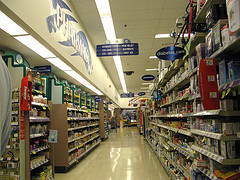DEA: Walgreens Ignored Signs, Encouraged Questionable Sales Of Oxycodone At Florida Pharmacies
In June 2010, a Walgreens in Oviedo, FL, just outside of Orlando bought 6,600 oxycodone pills, filling around four prescriptions per day. This is a truly unremarkable number of pills and prescriptions.
Then the next month, a letter came down Walgreens HQ, saying that it believed more could be done to increase sales in stores with such unremarkable numbers.
“We need to make sure we aren’t turning legitimate scripts away,” reads the letter, uncovered by the Orlando Sentinel. “Please reinforce.”
Additionally, the DEA says that Walgreens was paying bonuses based on the number of prescriptions filled, further encouraging pharmacies to fill orders even when the pharmacists knew the drugs were not being used for legitimate medicinal purposes.
A year after the corporate office issued its edict, that same store in Oviedo purchased 169,700 oxycodone pills, an increase of 2,471%, and more than double what the average pharmacy receives in an entire year.
And this store wasn’t even the one with the largest increase in oxy purchases. The Orlando Sentinel has this chart showing the insane spikes in oxy demand at six Florida Walgreens.
Meanwhile, illegal activity in the store’s parking lot began to spike, as people would fill their oxy prescriptions at the Walgreens and then resell the pills immediately.
The Oviedo police chief says he wrote to the stores to let them know that they were filling prescriptions that were hitting the black market right away. He also reached out to Walgreens’ CEO and president in an attempt to alert them to the rather obvious problem.
“I got no response,” he tells the Sentinel. “I received nothing back from the corporate office.”
The DEA report found that pharmacies in the area were dispensing oxy and other oft-abused pills to people who had previously been arrested for drug offenses at those pharmacies.
“I find this to be a staggering disregard of Walgreens’ obligations under the Controlled Substance Act,” the DEA Administrator wrote.
The Oviedo store, along with five others that were identified as the most egregious in the DEA investigation, are now forbidden from selling oxy and similar drugs, including Vicodin and Xanax, through May 2014.
But it’s not just those handful of pharmacies that were the problem, says the DEA. The agency found that the Walgreens distribution center in Jupiter, FL, was supplying a large number of pills to many of the 800+ pharmacies it stocks.
A manager at the center also attempted to alert his supervisors about the soaring oxy sales, but his pleas went unheeded. That center has been blocked from dispensing oxy and similar drugs until Sept. 2014.
Meanwhile, Walgreens says it now places caps on orders from all stores so that this sort of abuse can’t happen as easily in the future.
The Oviedo police chief says that the DEA action has had a calming effect on the crime outside of the Walgreens in his town.
“Once they were suspended from filling the scripts,” he tells the Sentinel, “all that traffic stopped.”
Want more consumer news? Visit our parent organization, Consumer Reports, for the latest on scams, recalls, and other consumer issues.


